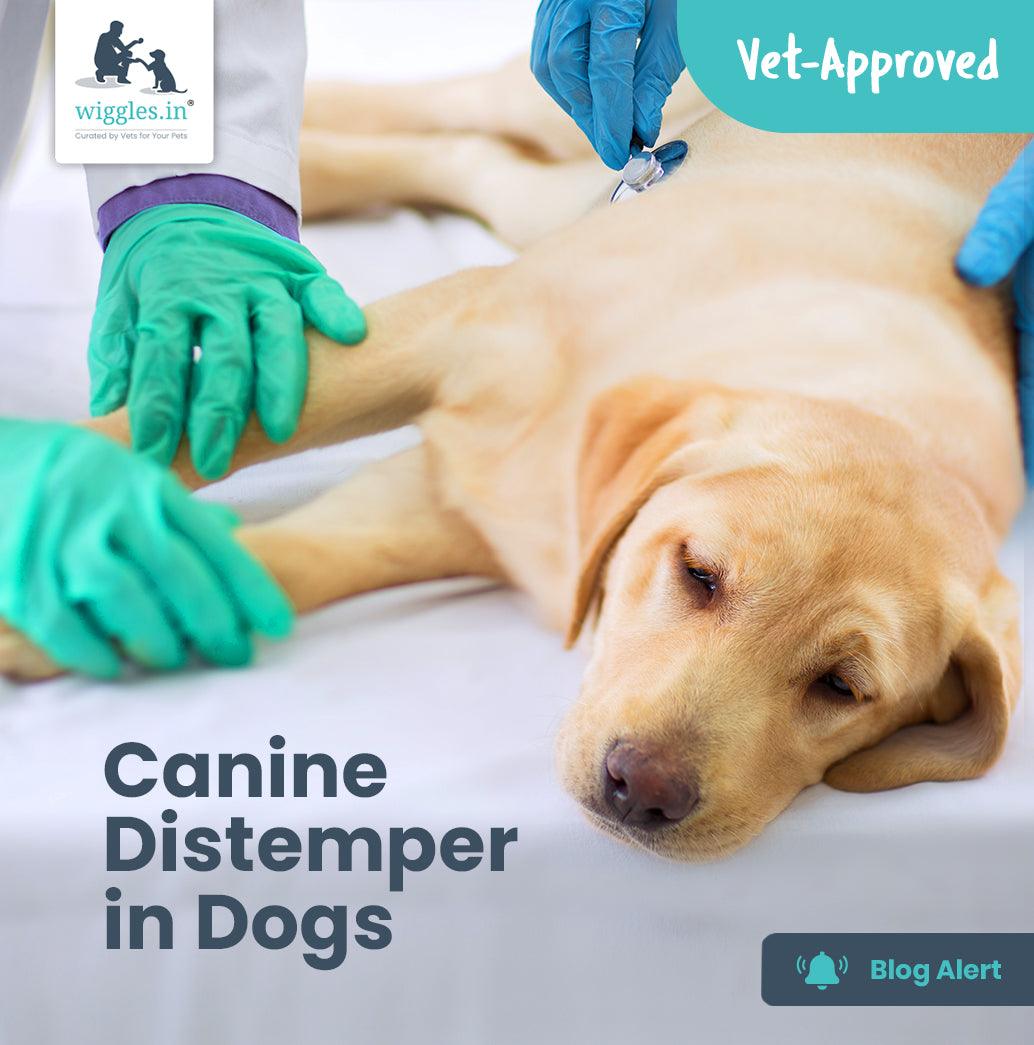Ask a veterinarian about one of the most contagious diseases in dogs & puppies & they will tell you it’s canine distemper. And rightly so. Canine distemper in dogs & puppies is a life-threatening disease. Most cases end in fatality & each year so many strays & pet dogs end up losing their lives. Over the years, the canine distemper virus breakout has claimed many lives across the country. And it leaves a lot of pet parents, rescuers & animal shelters worrying about the health of their dogs.
But with the right knowledge & guidance, canine distemper can be defeated. In this blog, we will try to understand canine distemper in depth.
- What is canine distemper?
Canine distemper is caused by a virus known as paramyxovirus. Just like any other virus, this is also highly contagious. It can disguise itself in other common forms of viral infections in dogs and may take some time for the symptoms to finally show. It’s this delay that causes great damage. The canine distemper virus generally spreads through coughing & sneezing by an infected puppy.
- How does canine distemper spread?
There are 4 most common ways in which the canine distemper virus can spread
- Direct contact with an infected dog or puppy - Direct contact can happen through socializing at doggy parks or during walks through sniffing & licking an infected puppy.
- Through airborne exposure - When a puppy sneezes, the air can carry the particles up to 25 feet. Any puppy or young dog that comes in contact within that area can easily contract the virus.
- Mothers can also pass on the virus to their puppies through the placenta - If the mother is not properly vaccinated, she can end up passing the virus to her puppies.
- Indirect exposure - Since the virus can infect surfaces, any indirect contact with a contaminated surface can also lead to canine distemper. For example - through a healthy dog’s contaminated fur, food, supplies, a common bowl of water etc. The good news is, the virus can easily be destroyed using disinfectants.
It is also important to remember that an infected dog sheds the virus for days during & post-recovery. Therefore, isolation becomes extremely crucial for at least 4 months.
- Symptoms of canine distemper in dogs?
The symptoms associated with canine distemper usually begin with watery discharge from the eyes. This will be followed by high to very high fever, nasal discharge, difficulty in breathing, sneezing & coughing. The puppy will become lethargic & will experience a complete loss of appetite accompanied by vomiting.
The symptoms of canine distemper are like any other illness but only more fatal. They can be summarized in the following pointers -
- Nasal & eye discharge
- High fever
- Lethargy
- Sneezing & coughing
- Difficulty in breathing
- Vomiting & diarrhea
- Loss of appetite
- Pneumonia
- Skin sores
- Acute pain
Unfortunately, the symptoms don’t end here. The canine distemper virus spreads quickly in a puppy’s body. So much so that it also affects the brain & the nervous system. This can lead to even severe forms of symptoms. Once the virus reaches the brain, it attacks the nervous system & leads to -
- Circling behavior
- Head tilts
- Twitching of muscles
- Convulsions
- Jaw chewing movements & excessive salivation
- Seizures
- Partial or complete paralysis
- Involuntary movements
- Thickening of nose and footpads
- How to prevent it?
It is rightly said that prevention is better than cure. And this stands true in canine distemper as well. The most effective form of prevention against canine distemper is to get vaccinated.
In India, puppies receive a vaccine known as DHPP - a vaccine for immunization of dogs against canine distemper virus, canine adenovirus/hepatitis, canine parvovirus and canine parainfluenza virus. Puppies first receive a dose of this vaccine when they are 6 to 8 weeks old until they are 4 months old. Veterinarians also recommend booster doses for the same. Post-vaccination, your puppy may show some signs of discomfort (due to injection of foreign protein) but they subside in the next 24 to 48 hours. Visit your veterinarian if the symptoms continue even after 48 hours.
If your puppy or dog loves to socialize with strays, it is suggested that you ensure that even they receive their vaccinations.
- What are some extra measures?
As a safety precaution, please follow the below-mentioned measures to keep your puppy protected against canine distemper -
- Don’t let your puppy sniff another puppy/dog or lick their poop. You never know if the puppy or dog is infected with the virus.
- Maintain proper hygiene when it comes to bathing & cleaning the paws post walks etc. Always carry a pet sanitizer, use it as & when required.
- Don’t take any early-stage symptoms lightly. Don’t delay & consult your veterinarian at once. Early detection means a better chance of survival.
- There are seasonal or annual outbreaks of canine distemper. Keep a track of the news to see if there are any cases of canine distemper in your region, city or state. In such a case, please be extra cautious & prevent any form of outdoor exposure for your puppy.
- When to see a veterinarian?
There’s no wrong time to see a veterinarian when it comes to canine distemper. If you see a symptom during the outbreak season or if you get to know that your puppy has come into contact with another infected puppy or dog. Both cases warrant an immediate visit to the veterinarian.
- Is canine distemper contagious to humans?
As per the present research & knowledge, canine distemper doesn’t spread to humans. So even if your puppy has contracted this virus, you can easily take care of them. Although, it is highly contagious from puppy to puppy or dog. So if you have more than one dog at home, isolate them in different rooms/spaces to prevent an outbreak.
- What’s the treatment for canine distemper?
The treatment for canine distemper starts with isolating the infected puppy from others. This can be done by keeping them in a crate, separated from the rest. This is necessary since the puppy will be shedding the virus & this puts other puppies & young dogs around at risk. Hospitalization is a must.
Depending on the symptoms & their gravity, the veterinarian will suggest the course of treatment -
- Gastrointestinal & fluid support - The first symptoms of canine distemper begin with eye discharge followed by diarrhea & vomiting that leads to dehydration. This weakens the immune system further & makes them vulnerable to other infections. Such cases require intravenous fluid therapy supplemented with anti-vomiting medications, antibiotics, probiotics for the gut & intravenous nutritional support.
- Respiratory support - Trouble in breathing is another sign of canine distemper & can become severe if not tended to. In this case, your veterinarian may suggest oxygen therapy, antiviral medications & antibiotics.
- Blood transfusion - Although rare, in extreme cases, blood transfusion can also be required. The recipient needs to receive blood from a healthy donor dog, preferably from someone who has recovered from canine distemper at least 3 months ago. The donor will have the antibodies & timely donation can save the puppy’s life.
- What’s the road to recovery from canine distemper?
Canine distemper is deadly but our puppies & dogs are warriors too. It is true that it leads to mass fatality but it’s also true that with timely intervention & support, puppies get to grow old. Post recovery, your puppy will still remain isolated since the shedding of the virus continues for a period of 4 months.
Once back home, your veterinarian will prescribe a healthy, nutritious & fluid intensive diet to aid their recovery. It’s also highly possible that you will have to limit their outdoor exposure due to a weak immune system.
Please follow your veterinarian’s advice & make regular checkup appointments as well. With the right information, guidance & care, canine distemper can easily be defeated!


















